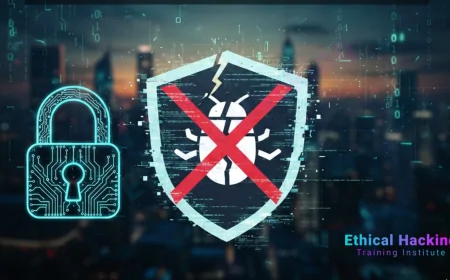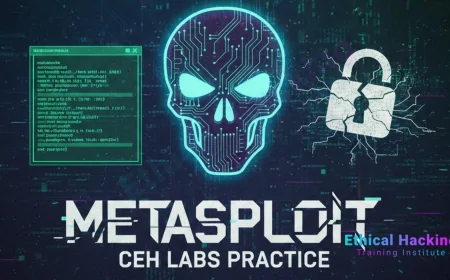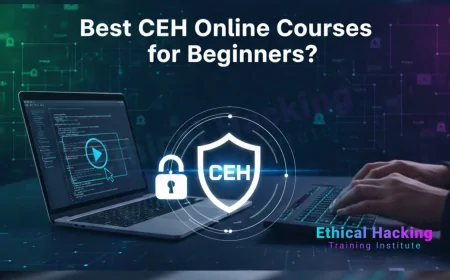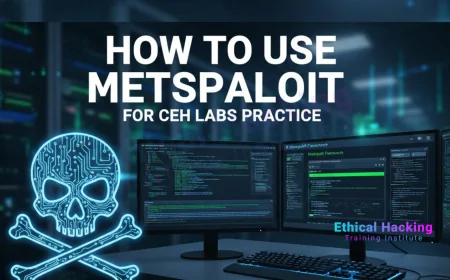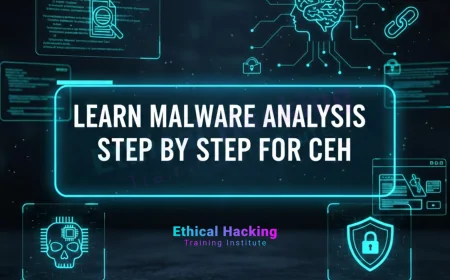Ethical Hacker Bootcamp: A Comprehensive Guide to Intensive Ethical Hacking Training | From Beginner to Pro: Ethical Hacking Bootcamp Guide for 2025
Explore a complete guide to ethical hacker bootcamps. Learn skills, tools, certifications, costs, and how to choose the best ethical hacking training.
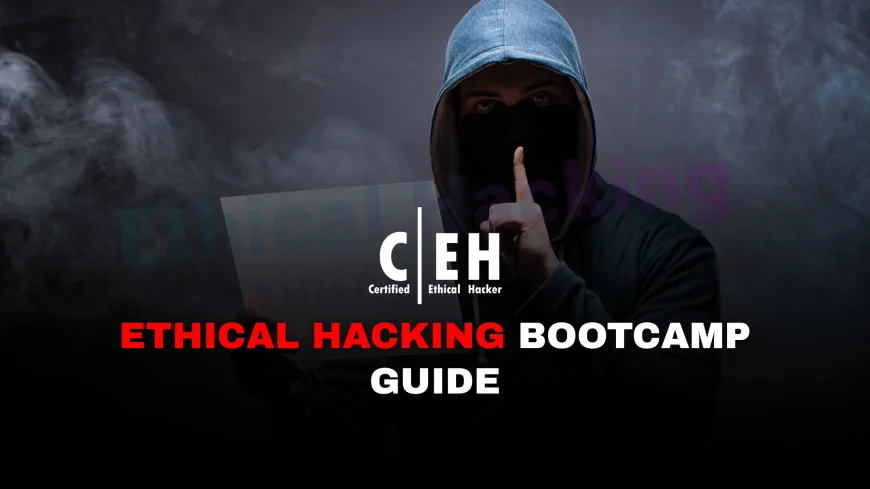
Table of Contents
- Introduction to Ethical Hacker Bootcamps
- What is an Ethical Hacker?
- Bootcamp vs. Degree: Which is Better?
- Structure of an Ethical Hacking Bootcamp
- Skills and Topics Covered in Bootcamps
- Top Certifications You Can Earn
- Essential Tools Taught in Bootcamps
- Real-World Training and Labs
- Who Should Join an Ethical Hacking Bootcamp?
- How to Choose the Right Bootcamp
- Online vs. Offline Bootcamps
- Benefits of Intensive Ethical Hacking Training
- Cost of Ethical Hacking Bootcamps
- Job Prospects After Completion
- Success Stories and Case Studies
- Frequently Asked Questions (FAQs)
- Conclusion
Introduction to Ethical Hacker Bootcamps
In an age of data breaches, ransomware, and cyber warfare, the need for skilled ethical hackers has never been greater. Ethical hacker bootcamps offer an accelerated, hands-on training experience designed to equip individuals with practical knowledge in real-world cybersecurity scenarios. These programs bridge the gap between foundational IT knowledge and advanced penetration testing, preparing students for industry-recognized certifications like CEH (Certified Ethical Hacker).
What is an Ethical Hacker?
An ethical hacker, or white-hat hacker, is a cybersecurity professional who tests networks, systems, and applications for vulnerabilities—legally and with permission. Their role is to mimic the tactics of malicious hackers to identify and patch weaknesses before exploitation can occur. They are employed by corporations, government agencies, and consultancies to improve cyber resilience.
Bootcamp vs. Degree: Which is Better?
Traditional degrees provide theoretical depth, but bootcamps offer condensed, job-focused training with immediate hands-on skills. Here’s a quick comparison:
- Bootcamps: 2–16 weeks, practical, fast-track to job readiness
- Degree Programs: 3–4 years, academic, broader coverage
If your goal is rapid entry into the cybersecurity workforce, a bootcamp is often the most efficient choice.
Structure of an Ethical Hacking Bootcamp
Most bootcamps follow a modular structure that builds skills progressively:
- Cybersecurity Fundamentals
- Network Security
- Linux and Windows Security
- Cryptography and Encryption
- Penetration Testing Methodologies
- Ethical Hacking Tools and Labs
- Capstone Project or Final Assessment
Skills and Topics Covered in Bootcamps
Bootcamps dive deep into essential cybersecurity domains:
- Information Gathering & Reconnaissance
- Vulnerability Scanning
- Exploitation Techniques
- Web Application Security (SQL Injection, XSS)
- System Hacking & Privilege Escalation
- Sniffing, Spoofing, and Session Hijacking
- Firewall and IDS Evasion Techniques
Top Certifications You Can Earn
Many bootcamps prepare you for globally recognized certifications such as:
- CEH (Certified Ethical Hacker)
- CompTIA Security+
- PenTest+
- OSCP (Offensive Security Certified Professional)
- eJPT (eLearnSecurity Junior Penetration Tester)
Essential Tools Taught in Bootcamps
Ethical hacking tools form the foundation of bootcamp training. These include:
- Nmap – Network scanning
- Metasploit – Exploitation framework
- Burp Suite – Web application testing
- Wireshark – Packet analysis
- John the Ripper – Password cracking
- Kali Linux – Penetration testing OS
Real-World Training and Labs
Bootcamps emphasize simulation-based learning through:
- Virtual labs and sandbox environments
- Hack The Box and TryHackMe integration
- Live cyber range assessments
- Final red team/blue team exercises
Who Should Join an Ethical Hacking Bootcamp?
These bootcamps are ideal for:
- IT professionals looking to upskill in security
- Students seeking practical cybersecurity exposure
- Career changers entering the tech field
- Freelancers or bug bounty hunters
How to Choose the Right Bootcamp
Consider the following before enrolling:
- Instructor credentials and industry experience
- Live vs. recorded sessions
- Access to labs and toolkits
- Certification exam vouchers included?
- Career support and job placement services
Online vs. Offline Bootcamps
Online Bootcamps: More flexible, cost-effective, and accessible globally.
Offline Bootcamps: Offer live interaction, networking, and real-time mentorship. Choose based on your learning preference.
Benefits of Intensive Ethical Hacking Training
- Rapid skill development and job readiness
- Practical, project-based learning
- Access to the latest hacking tools
- Industry-recognized certifications
- Increased salary potential and job security
Cost of Ethical Hacking Bootcamps
Bootcamps vary from ₹25,000 to ₹2,00,000 (INR) or $500 to $5,000 (USD), depending on the location, duration, and included certifications. Many offer EMI and financing options.
Job Prospects After Completion
Graduates can pursue roles such as:
- Penetration Tester
- Security Analyst
- Cybersecurity Engineer
- SOC Analyst
- Bug Bounty Researcher
Success Stories and Case Studies
Many bootcamp grads land cybersecurity jobs in under 6 months. For example, a non-technical graduate from Pune completed a 12-week bootcamp and now works at a cybersecurity startup as a junior pentester earning ₹6.5 LPA.
Frequently Asked Questions (FAQs)
1. What is an ethical hacker bootcamp?
It's an intensive training program designed to teach hands-on ethical hacking and cybersecurity skills in a short time frame.
2. How long does a bootcamp last?
Bootcamps typically last between 4 to 16 weeks, depending on the depth and format (part-time or full-time).
3. Do I need prior IT knowledge?
Some bootcamps accept beginners, while others require basic networking or Linux skills.
4. Are bootcamps better than a college degree?
For rapid skill development and job readiness, bootcamps are often more efficient, but degrees offer broader academic knowledge.
5. What certifications do bootcamps prepare you for?
CEH, CompTIA Security+, OSCP, and eJPT are common targets.
6. Are bootcamps recognized by employers?
Yes, especially when paired with certifications and a strong portfolio of practical work.
7. How much do ethical hacking bootcamps cost?
They range from $500 to $5,000 (₹25,000 to ₹2,00,000 INR), depending on location and features.
8. Are online bootcamps as effective as offline ones?
Yes, if they offer interactive labs, mentorship, and community engagement.
9. Can I get a job after completing a bootcamp?
Many bootcamp graduates secure jobs in cybersecurity within 3–6 months of completion.
10. What tools will I learn?
Kali Linux, Metasploit, Nmap, Burp Suite, and Wireshark are standard.
11. Are bootcamps suitable for career changers?
Absolutely. They're designed to equip even non-tech individuals with job-ready skills.
12. Will I work on real projects?
Yes, most bootcamps offer capstone projects, live challenges, or red team/blue team simulations.
13. Do bootcamps provide job placement support?
Many offer career services, mock interviews, and resume support to aid job placement.
14. Can I join a bootcamp while working full-time?
Yes, many offer part-time or weekend options for working professionals.
15. What are the career prospects after a bootcamp?
Penetration tester, SOC analyst, and cyber security consultant are common roles.
16. Do bootcamps provide a certificate?
Yes, you'll receive a completion certificate, and often be prepared for global cert exams.
17. How do I choose the best bootcamp?
Look for experienced instructors, live labs, certification prep, and job support.
18. Are ethical hacker bootcamps worth it?
If you want a fast, practical path into cybersecurity, they are a smart investment.
19. Do bootcamps require coding knowledge?
Not always, but understanding scripting languages like Python helps.
20. Can I work as a freelancer after a bootcamp?
Yes, many bootcamp grads become freelance penetration testers or bug bounty hunters.
Conclusion
Ethical hacker bootcamps are intensive, focused, and result-driven programs that fast-track your cybersecurity career. With real-world labs, mentorship, and certification prep, they equip learners with the tools and mindset needed to thrive in a digital-first world. Whether you're transitioning careers or upskilling, a bootcamp can be the launchpad into ethical hacking and beyond.
What's Your Reaction?
 Like
2
Like
2
 Dislike
0
Dislike
0
 Love
0
Love
0
 Funny
0
Funny
0
 Angry
1
Angry
1
 Sad
0
Sad
0
 Wow
0
Wow
0
